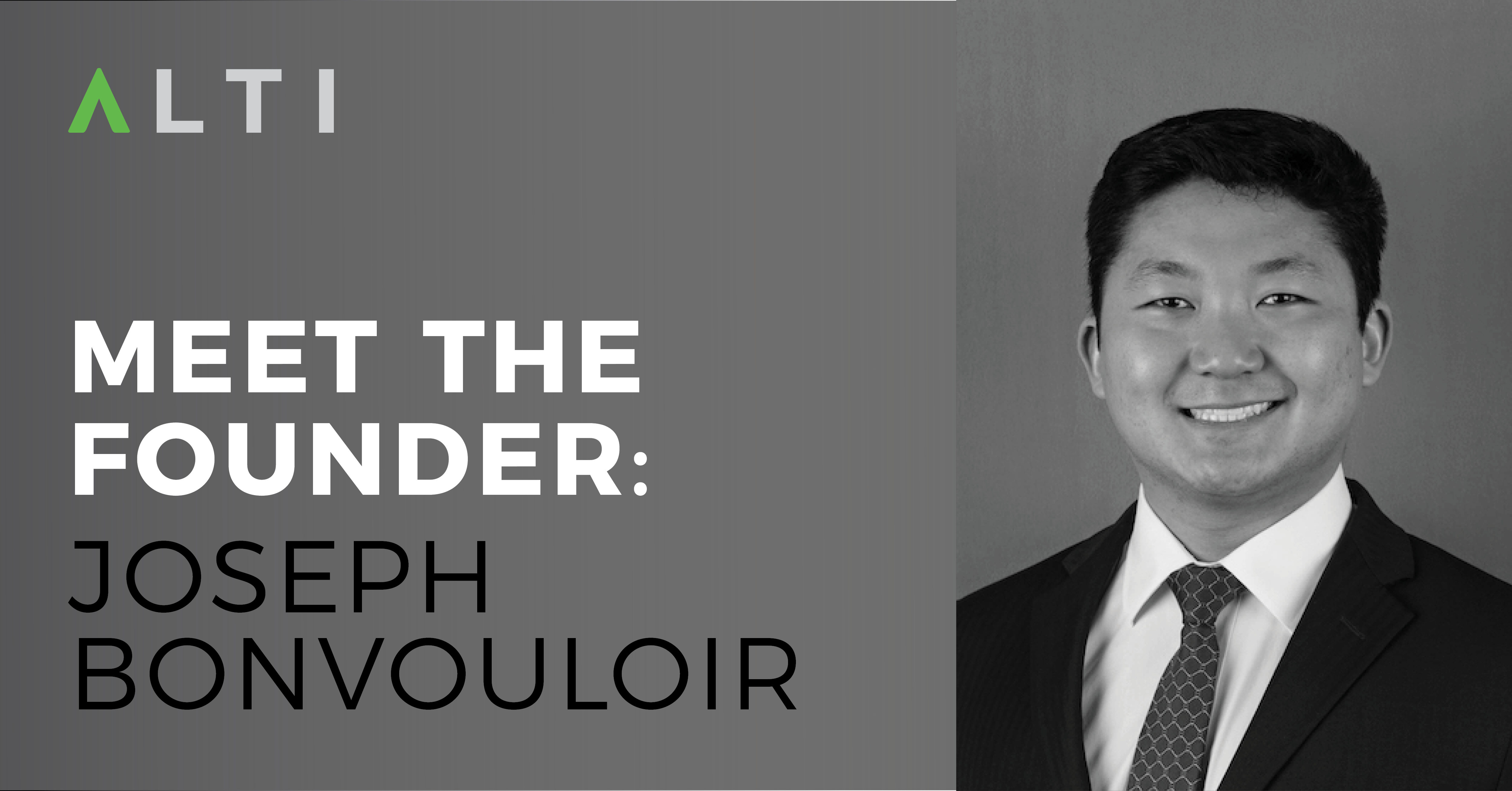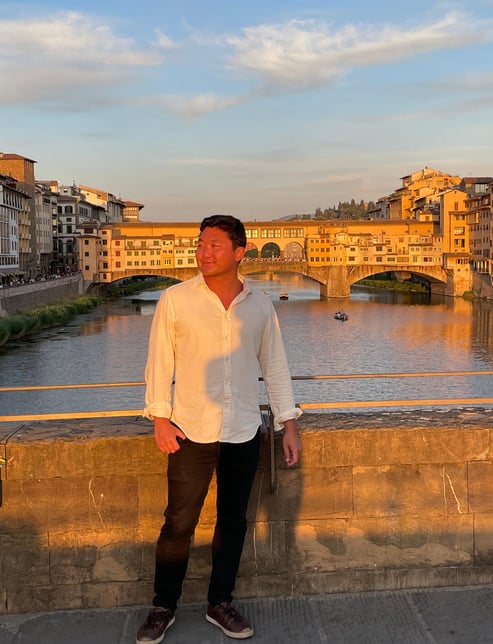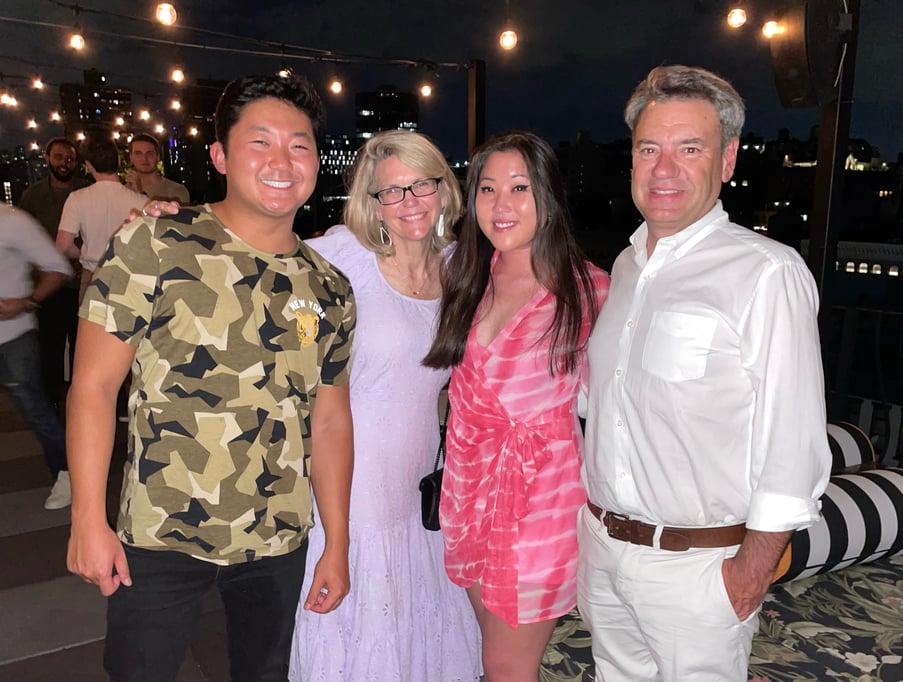Meet the Founder: Joseph Bonvouloir
Private equity has been the final frontier for everyday individual investors. A number of obstacles have stood in the way of the democratization of this lucrative investment category, but with recent financial innovations and regulatory outlook developments, Joseph Bonvouloir has made it his mission to create a vehicle that will expand access to high-quality private equity opportunities. We had the chance to catch up with Joseph and here he shares how some of his professional and personal experiences gave him the confidence to take on this new challenge.

What led you to the founding of Alti?
When I started working in private investments at a top-tier investment bank and saw the types of returns the firm was generating on direct deals and some of the funds we were working with, I asked the managing partner of my group how I could invest my own money into the funds. He laughed in response, and told me that maybe in ten years - if things go well - I’d have enough money to put into one of our products. I was aware that other non-traditional asset classes were in the process of democratizing, so that barrier immediately struck me as an opportunity worth pursuing. I began reaching out to lawyers and others in the industry about ways to create a vehicle that would give the same institutional feel of the GP/LP structure, but in a registered format that would be accessible to a much wider set of individual investors without hitting them with multiple layers of fees.
Could you describe your role at Alti?
To put it simply, my job has been to bring together the best possible set of minds for this project to make sure we’re creating a product of the highest quality. On the investment side, we’ve brought in people like Sheryl who is top of her field in institutional private equity. Our partnership with Portfolio Advisors will also ensure that we have access to the strongest deal flow that the highest caliber and brand name funds have to offer. On the compliance and operations side, we have a team of problem solvers with deep experience in navigating complex ‘40 Act structures, and our relationship with Mayer Brown and the former CCO of Fitch Ratings has given us a direct communication line with SEC staff.

Is there a mentor who played a big role in getting you to where you are today?
It’s tough for me to pick one in particular, I’ve always loved to gather as many perspectives as possible. That said, my father, who was in the insurance business, has always been one of my greatest sources of influence. As a boy I started hearing about wild stories and characters on Wall Street, and he always did a fantastic job describing concepts to me, providing me with books and other resources, and encouraging me to pursue my growing passion for finance.
At one point he suggested that I try to reach out to and make connections with people who work in the industry. He explained to me that since I was still in high school, I’d stand out and be more likely to get responses compared to say a junior in college looking for an internship. I jumped on his advice, and a few weeks later when he checked in to see how things were going his jaw dropped when I told him I’d set up conversations with a couple of senior partners at Goldman Sachs who were involved in a big merger I’d read about. The partners thought it was hilarious that a sophomore in high school could show so much interest in what they were doing and I think they only responded to me for their own self-amusement, but in the end my irreverence paid off and I was able to build a great relationship with one of them. He ultimately helped me break into the industry as an intern.
When you began your career in investment banking, did you expect to stay on a more traditional path, or have you always had the feeling that you were cut out to be an entrepreneur?
My nature has always been to challenge the status quo and keep pushing forward on any idea I want to execute on. Coming out of college I knew I wanted to make an impact in the financial industry, but I also knew that the industry is much more age-conscious than the tech industry, for example, where it’s not uncommon for startups to be founded by twenty-somethings. And so it took some time for the right idea to develop and for me to build the type of support network that’s needed to create something exciting and successful.
What gave you the confidence to start a new firm at such a young age?
My parents like to joke about my lack of respect for traditional hierarchies. While that attitude didn’t always pay off as a young kid around certain authority figures, I think it’s played an important part in the success I’ve had in my career. One of the partners I worked for at Goldman and have huge respect for, always used to stress the importance of listening to the youngest people at the table and the fresh perspective and creative solutions to problems that they can bring. I loved that he gave me the freedom and confidence to speak my mind.

Do you have an overarching investment philosophy?
I think investors too often make the mistake of chasing trends and focusing on themes that are already well understood or established. The best opportunities in my view are those that markets don’t yet have a lot of insight on, or those that aren’t given much attention.
What do you like to read?
At the moment most of my time is spent reading emails! In general I love a mixture of fiction and non-fiction. Since I was a kid I’ve been a huge fan of Steven King novels. On the non-fiction side I’ve always been drawn to biographies of business leaders to learn about what’s been behind their success. I much prefer having a physical book to read. Lately I’ve been trying to get into audiobooks but without much success. I inevitably start multitasking.
Do you have a favorite quote?
Steve Schwarzman recently published an autobiography called What It Takes, and one of the key points he focuses on as he describes how he built Blackstone into what it is today is that “the harder the problem, the more limited the competition.”
People in finance, or any industry for that matter, tend to gravitate towards iterative solutions to simple problems. When there’s a really complex problem, that’s when you see most people start to shy away or make excuses. Those who are willing to tackle the most difficult problems are the ones who are going to make the biggest impact in whatever field they’re in.
If you weren’t in asset management, where else could you see yourself working?
I think New York hospitality is fascinating and in another world I could imagine myself in that industry, perhaps running a restaurant group. I got a taste for hospitality as a teenager working as a caddy outside of Boston, but I think there’s something really unique about hospitality in New York. Two of my good friends own several restaurants downtown and I love to hear their stories and learn how they’ve been able to bring together fantastic teams of chefs, servers and operators to create incredible experiences that the most successful and interesting people in our city frequent. The exposure they get to such a wide range of interesting people and the highly competitive nature of the business would keep me very stimulated.
What do you like to do in your spare time?
I love to travel to exciting places with great people. Like a lot of New Yorkers I try to escape the summer heat as much as possible. This past summer I was able to visit Tuscany and Mallorca for a few weeks and both were amazing. My most memorable travel experience goes back to my semester abroad in Hong Kong as an undergrad. I was able to explore Korea, mainland China, Cambodia, and Vietnam and it was an incredibly eye-opening adventure.

Do you have a favorite Wall Street movie?
Too Big To Fail. The film did such a good job of showing how the different personalities had to come together to solve the 2008 crisis as it was unfolding
.